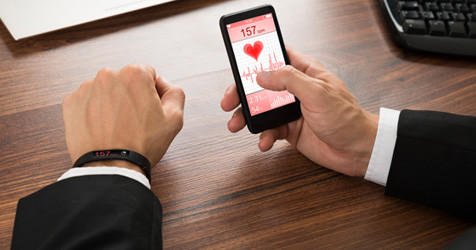
IDEAL HEART RATE:
Friday, October 25, 2019WHAT IS HEART RATE?
Heart rate, also known as pulse, is the number of times a person's heart beats per minute. A normal heart rate depends on the individual, age, body size, heart conditions, whether the person is sitting or moving, medication use and even air temperature. Even emotions can have an impact on heart rate. For example, getting excited or scared can increase the heart rate. But most importantly, getting fitter lowers the heart rate, by making heart muscles work more efficiently.
Knowledge about your heart rate can help you monitor your fitness level, and it may help you spot developing health problems.
WHERE TO MEASURE HEART RATE?
The easiest places to measure your heart rate are on the wrists or one side of the neck. For an accurate reading, put two fingers over one of these areas and count the number of beats in 60 seconds.
WHAT IS RESTING HEART RATE?
Your resting heart rate is your pulse when you are calmly sitting or lying. It’s best to measure your resting heart rate in the morning before you get out of bed, according to the American Heart Association (AHA). For adults 18 and older, a normal resting heart rate is between 60 and 100 beats per minute (bpm), depending on the person’s physical condition and age. For children ages 6 to 15, the normal resting heart rate is between 70 and 100 bpm, according to the AHA.
Some people may have a heart rate lower than 60, but that doesn’t necessarily mean they have a medical problem. Active people often have lower heart rates because their heart muscles don't need to work as hard to maintain a steady beat. Athletes and people who are very fit can have resting heat rate of 40 bpm.
However, if coupled with symptoms, a low heart rate or even a higher heart rate may signal a medical problem.
WHAT IS MAXIMUM AND TARGET HEART RATE?
There is no definitive medical advice on when a resting heart rate is too high, but most medical experts agree that a consistent heart rate in the upper levels can put too much stress on the heart and other organs.
Most commonly, maximum heart rate is calculated by subtracting your age from 220:
220 - Age. For a 30-year- old person, for example: 220 - 30 = 190.
The target zone for a 30-year- old person would be between 50 and 85 percent of his or her maximum heart rate:
For older people, the formula for the maximum heart rate is: 208 – (0.75 x Age)
You can either manually calculate your heart rate during exercise or use heart rate monitors that wrap around the chest, or are included in sports watches.
HOW TO LOWER A RAPID HEART RATE?
Pulse rates can spike due to nervousness, stress, dehydration and overexertion. Sitting down and taking slow, deep breaths can generally lower your heart rate. Exercising and getting fitter will usually lower heart rate, too.
WHAT ARE THE CONDITIONS THAT IMPACT HEART RATE?
A number of conditions can affect your heart rate. The conditions that impact heart rate are:
- Arrhythmia: An arrhythmia causes the heart to beat too fast, too slow or with an irregular rhythm.
- Tachycardia: It is a resting heart rate of over 100 beats per minute and generally is caused when electrical signals in the heart's upper chambers fire abnormally. If the heart rate is closer to 150 bpm or higher, it is a condition known as supraventricular tachycardia (SVT).
- Bradycardia: It is a condition where the heart rate is too low, typically less than 60 bpm. This can be the result of problems with the sinoatrial node, which acts as the pacemaker, or damage to the heart as a result of a heart attack or cardiovascular disease.
WHY KIMS?
Being one of the best cardiology hospitals in Hyderabad with one of the best cardiology specialists in Hyderabad, KIMS has a dedicated unit for managing and resolving heart issues. Our Heart Wellness Centre in Hyderabad ensures that patients with cardiac problems have their heart rate monitored regularly and accurately. We ensure that patients maintain their target heart rate while recouping from surgery as well as after getting treatment.
